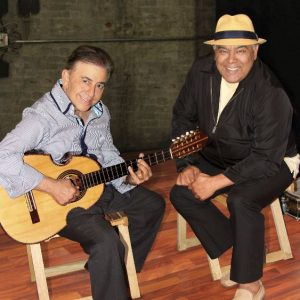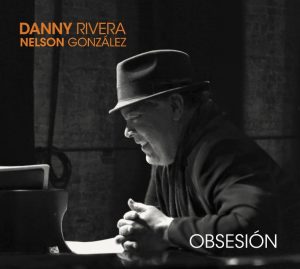I had the privilege to interview Puerto Rican star singer Danny Rivera ahead of the release of “Obsesion”, his upcoming Bolero album. Here I include 2 audio clips where Danny explains how the Bolero is the history of our feelings and how it is passed through generations.
I was humbled by the opportunity to have a conversation with the singer known as “la voz nacional de Puerto Rico” (the national voice of Puerto Rico). Danny Rivera, who just turned 69 this past February, collaborated in “Obsesion” with legendary Puerto Rican tres guitar player Nelson Gonzalez, who was the Musical Producer of the album. Danny was very pleasant and forthcoming during our conversation, making me feel at ease.
Bolero Represents the Feeling of Latin America
As Danny Rivera and I embarked in an enjoyable conversation about his new Bolero album, I asked Danny how he saw the health of the Bolero genre, and what audience age he sees at his live performances. This brought a profound explanation by the performer of “Amada Amante” about the Bolero.

“The Bolero represents the feelings of Latin America. It is a necessity of the soul to express its feelings.” said Danny. In his blog which you can find HERE, Danny says “..they say that it hurts to love, and that singing (these love songs) is the best way to ease the pain. But that’s a lie…a song is a sedative that lasts a short time, because if it lasted a long time, it would become a routine.”
In looking to ease our love pain, many great Latin American song writers have produced great musical jewels, which according to Danny Rivera “…remain in the collective subconscious of Latin America.”
As we continued our conversation and touched on the newer generation of romantic singers, I understood better what Danny meant by this “history” of the Bolero, particularly when he said that the bolero “remains in the collective subconscious of Latin America”, while he explained how songs are passed through generations.
“The people born on the last century with the Bolero that today are older ‘super-adults’ like myself, had children, and those children had grandchildren. And although the next generation grew up listening to a different type of music, some of them will listen to (the Bolero) because ‘dad’ played it to them.”
“So this generation grows listening to their music, but that ‘other music’ remains in their subconscious because grandpa played it to them. And one day it comes out. It brings in them great memories of encounters with their dad, with their granddad, with their family,…of something that is transcendental in the process of getting to know themselves. These is how the Bolero becomes an instrument of unification.”
In this audio-clip of my conversation with Danny Rivera, he explains why the Bolero is a history of our most intimate feelings:
The Reason Luis Miguel Sings Boleros

Danny explains that “the old folks like myself that sang those Boleros influenced, almost forced the current generations of singers, in one way or another, to sing Boleros. That’s how a Luis Miguel is (artistically) born. His father was a friend of mine, and we went out singing Boleros in ‘bohemias’…and therefore Luis Miguel heard those as an infant.”
“When Luis Miguel became this great artist, with his great voice, etc., one day he comes out singing Boleros, in a time when no one of his generation sang Boleros. Therefore, he spreads the Bolero to his generation, and in doing so he gives the Bolero another push. And now, the generation of Luis Miguel will play those songs to their children, and so it goes on successively like that.”
In this audio-clip of my conversation with Danny Rivera, he explains how the Bolero has been passed through generations, including his insights regarding Mexican singer Luis Miguel:
My Own Experience with “Piel Canela”
As Danny Rivera made this great story, I shared with him my own experience. My father liked all kinds of music, and the album of Eydie Gorme with the Trio Los Panchos was one of many my father liked.
When he passed away, I took some CDs he had in his vast collection, one of them was the CD of Eydie Gorme with Los Panchos (which he bought in CD format when it became available). I immediately loved it for the reasons Danny mentioned; it brought me great memories of my father. And one day I was playing the CD and singing ‘Piel Canela’ when my little daughter started singing with me the catchy part of “…me gustas tu, y tu, y tu, y nadie mas que tu, y tu, y tu…”. And as I said to Danny, one day, when she grows up, she will bring that song out, and perhaps play it to my grandchildren.
“Of course she will” said Danny Rivera, “…it’s an extraordinary chain that extends our collective memory”. That’s why I understand Danny when he says “the Bolero is a history of our most intimate feelings”.
It sure is! I have more of my conversation with Danny Rivera coming soon, as well as a review of “Obsesion”.
“Obsesion” is scheduled to come out March 25.


Excelente, extraordinario y único en su genero, Que Grande.
En mi entrevista con Nelson Gonzalez, el dice algo con lo cual estoy deacuerdo. Danny Rivera canta de todo, asi que no es cantante de un solo genero! Pocos pueden decir eso. Pendiente al blog con Nelson Gonzalez donde el expande en este detalle.
[…] …and if you want to learn more about the Bolero, I had a great interview with legendary Puerto Rican singer Danny Rivera, where he gave me his perspectives on it HERE. […]
[…] with Edwin, there are two great guests. Singers Danny Rivera “Voy a Pedirle a Los Reyes” and José Nogueras “Parrandeando Vamos” […]
[…] Singer – Daniel Santos is mostly remembered for his Boleros, and although true, that undermines his enormous talent. Santos could sing just about everything. […]
[…] a Juan Luis Guerra “Bachata”, a Carlos Vives “Vallenato”, a Maná “Rock in Spanish”, a Bolero by Luis Miguel, or even a Tito Puente Latin Jazz, I’ll be able to enjoy the music with them and […]